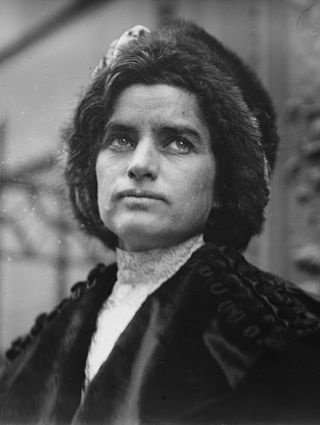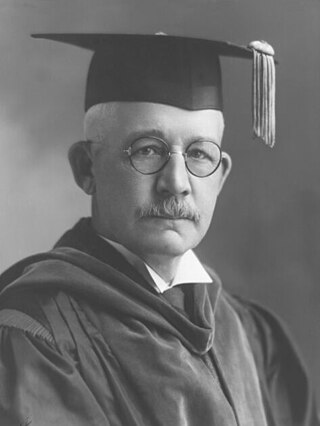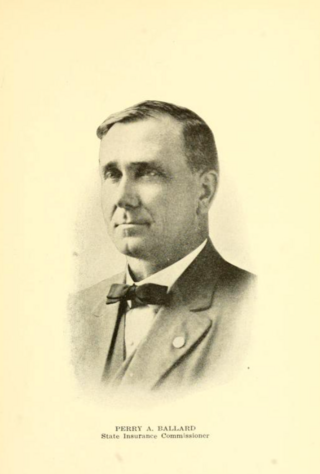
Charles Nathaniel Haskell was an American lawyer, oilman, and politician who was the first governor of Oklahoma. As a delegate to Oklahoma's constitutional convention in 1906, he played a crucial role in drafting the Oklahoma Constitution and gaining Oklahoma's admission into the United States as the 46th state in 1907. A prominent businessman in Muskogee, he helped the city grow in importance. He represented the city as a delegate in both the 1906 Oklahoma convention and an earlier convention in 1905 that was a failed attempt to create a U.S. state of Sequoyah.

Catherine Ann "Kate" Barnard was the first woman to be elected as a state official in Oklahoma, and the second woman to be elected to a statewide public office in the United States, in 1907. She served as the first Oklahoma Commissioner of Charities and Corrections for two four-year terms, the only position that the 1907 Oklahoma Constitution permitted a woman to hold.

Martin Edwin Trapp was an American state auditor, governor and lieutenant governor of the U.S. state of Oklahoma. Oklahoma's third lieutenant governor, he was the first to become governor not through an election but instead due to the previous governor's impeachment and removal from office.

James M. Petro is an American lawyer and politician of the Republican Party who served as the Attorney General of Ohio. Previously, Petro also served as Ohio State Auditor and he was a candidate for the Republican nomination for Governor of Ohio during the 2006 Ohio primaries, but lost to Ken Blackwell.

The Oklahoma State Auditor and Inspector is an elected Constitutional officer for the U.S. State of Oklahoma. The State Auditor and Inspector is responsible for auditing and prescribing bookkeeping standards of all government agencies and county treasurers within Oklahoma. The office in its current form is a consolidation of the office of State Auditor with that of the office of State Examiner and Inspector, both of which dated back to statehood in 1907. The two positions were combined in 1979 after passage of State Question 510 in 1975. Tom Daxon was the first person to hold the combined office and the first Republican as all previous occupants of either position were Democrats.

Edward P. McCabe, also known as Edwin P. McCabe, was a settler, attorney and land agent who became one of the first African Americans to hold a major political office in the American Old West. A Republican office-holder in Kansas, McCabe became a leading figure in an effort to stimulate a black migration into what was then the territory of Oklahoma, with the hopes of creating a majority-black state that would be free of the white domination that was prevalent throughout the Southern United States. In pursuit of this goal, McCabe founded the city of Langston, Oklahoma.

The Oklahoma State Board of Equalization is an agency of the state of Oklahoma that is responsible for tax administration. The Board is responsible for adjusting and equalizing the valuation of real and personal property of the several counties of Oklahoma. Board is also responsible for providing an estimate of all revenue that will be available for appropriation by the Oklahoma Legislature for the coming fiscal year.
Thomas E. Daxon was an American businessman and politician from Oklahoma. Daxon had held numerous positions with the Oklahoma state government, including being elected Oklahoma State Auditor and Inspector in 1978 and serving as the Oklahoma Secretary of Finance and Revenue under Governor of Oklahoma Frank Keating. He was the Republican nominee for governor in the 1982 election, ultimately losing to Democratic incumbent George Nigh.

Matthew John Kane was a justice of the Oklahoma Supreme Court from 1907 to 1923, serving as chief justice from 1909 to 1911. A native of New York state, he earned a law degree at Georgetown University. Joining the Land Run of 1889 in Indian Territory, he settled in Kingfisher, Oklahoma.
Samuel W. Hayes (1875–1941) was born in Arkansas, and moved to Texas with his parents when he was a small child. He completed his basic education in Texas, then attended the University of Virginia. He apparently did not graduate, but his college experience sufficed to qualify him as a school teacher. He spent the next three years teaching in the community of Ryan in the Chickasaw Nation, then part of the Indian Territory. He also began studying law in a local law office and was admitted to the Territorial Bar in 1899.
Frank E. Gillette was an American politician and attorney. He was one of the last judges appointed to the Supreme Court of Oklahoma Territory. He was appointed by President Theodore Roosevelt in 1902, and served until the court was abolished after statehood was granted to Oklahoma on November 16, 1907. Born in Ashtabula County, Ohio, on January 7, 1848, Gillette had moved with his parents to Emporia, Kansas when he was thirteen. After graduating from high school, he earned a degree from Kansas State Normal School then studied law and began to practice his profession in Hutchinson, Kansas in May, 1876. He moved to Kingman, Kansas and entered politics in 1882, where he was elected to the state legislature, representing Kingman County, and served for three terms. He was on the House Judiciary Committee, spending the last two years as chairman of that committee. He then was elected to the state senate and served for four years, which included serving as chairman of the Senate Judiciary Committee. At the end of his senatorial term, he moved to Oklahoma Territory and settled in El Reno where he opened a private law practice.

Leo Meyer was a politician in Texas and Oklahoma and was the first Jew elected to statewide public office in Oklahoma.
Joseph Thomas Dickerson was an American judge and politician who served on the United States Court for the Indian Territory between 1904 and 1907, in the Oklahoma House of Representatives between 1914 and 1916, and as an appointed judge in Oklahoma County.

Robert Dunlop was an American politician who served as the Oklahoma State Treasurer from January 9, 1911, to January 11, 1915.

Ed Boyle was an American politician who served as the Oklahoma Chief Mine Inspector and in the Oklahoma House of Representatives representing Haskell County.

Perry A. Ballard was an American politician who served as the 3rd Oklahoma Insurance Commissioner between 1911 and 1913.

Giles W. Farris was an American politician who was the only elected Oklahoma State Printer from January 1911 until his impeachment from office in February 1913. After his tenure, the office of State Printer was abolished by the Oklahoma Legislature, with the office officially ceasing to exist June 15, 1913.

Charles Clarence Childers was an American politician who served in the Oklahoma House of Representatives representing Garfield County and served three non-consecutive terms as the Oklahoma State Auditor, one term as Oklahoma Secretary of State, and one term on the Oklahoma Corporation Commission.
Elias McLeod Landrum was an American and Cherokee politician who served in the Oklahoma Senate from 1907 to 1913. Prior to Oklahoma statehood, he was a politician in the Cherokee Nation serving as a district judge, in the national legislature, and on the city council for the capital city of Tahlequah.














